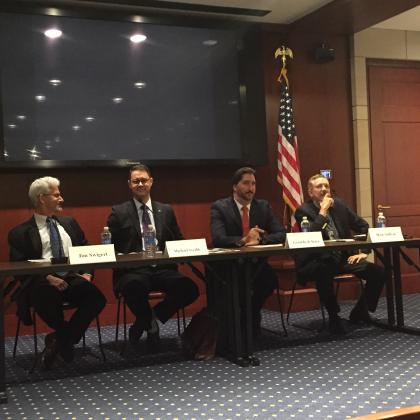
“Democratic Elections in Latin America ” Briefing on Capitol Hill
On September 18, 2015, International Foundation for Electoral Systems (IFES) Vice President of Programs Michael Svetlik participated in “Democratic Elections in Latin America,” the latest installment of Congressman Sam Farr’s (D-Calif.) “Latin America on the Rise” Congressional Briefing Series.
In addition to Svetlik, participants included Gerardo de Icaza, Director of the Department for Cooperation and Electoral Observation at the Organization of American States (OAS) and Jim Swigert, Senior Associate and Regional Director of Latin American and Caribbean Programs at the National Democratic Institute (NDI). Event moderator Mark Sullivan, Specialist in Latin American Affairs at the Congressional Research Service (CRS), introduced the panelists as representing “ three institutions that have played an important role in the region.”
Svetlik commended the Congressman for his leadership on Latin American issues, then highlighted IFES’ current programming to empower individuals and electoral institutions in Guatemala, Haiti, and Mexico. He discussed IFES’ technical support to the Guatemalan Supreme Electoral Tribunal (TSE) to counter electoral violence, enforce campaign finance regulations, and promote the inclusion of transgender and cisgender women in the electoral process. For example, IFES worked in support of the September 6 congressional and first-round presidential elections, which had the country’s highest-ever turnout at approximately 79 percent. IFES will continue to provide assistance for Guatemala’s October 25 second-round presidential elections.
Haiti’s first round presidential elections will also take place on October 25 (on what Swigert referred to as “Latin America’s Super Sunday”). Svetlik discussed challenges to the country’s August 9 legislative elections, including voter apathy and continued distrust of the Provisional Electoral Council (CEP), as reflected in extremely low voter turnout (18%). Part of IFES’ role in Haiti, as explained by Svetlik, will be to assist the CEP on increased transparency, voter education, and poll worker training.
De Icaza briefed participants on the role of the OAS, as well as “the good, the bad, and the coin toss” of Latin America’s electoral landscape. He highlighted several positive developments, including the rise of regional political parties, the increase in the sheer number of elections (indicating improved balance of power), and more plurality, as “The more inclusive elections are, the more legitimate they become.”
Swigert concluded the panel with remarks on NDI’s mission and programming in Colombia, Guatemala, and Peru. He also briefly remarked on the deteriorating political and economic situation in Venezuela, citing soaring crime rates and inflation, as well as the Maduro regime’s rejection of an OAS monitoring mission for the December 2015 legislative elections.









